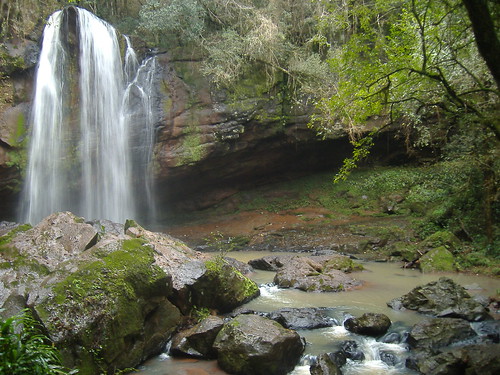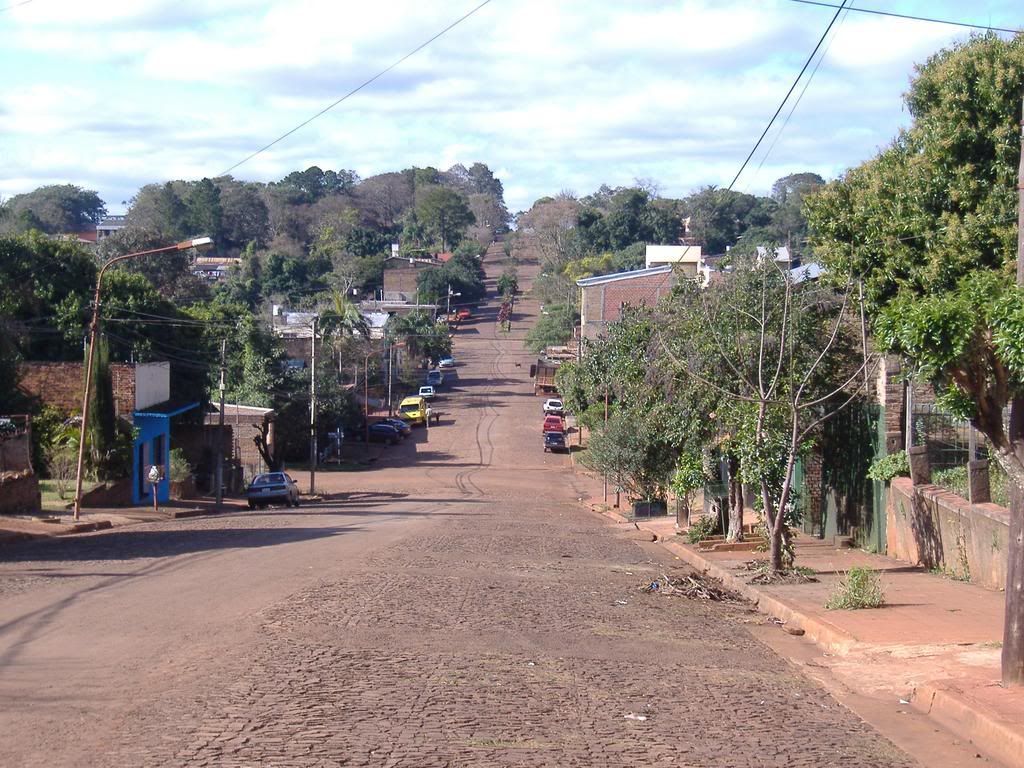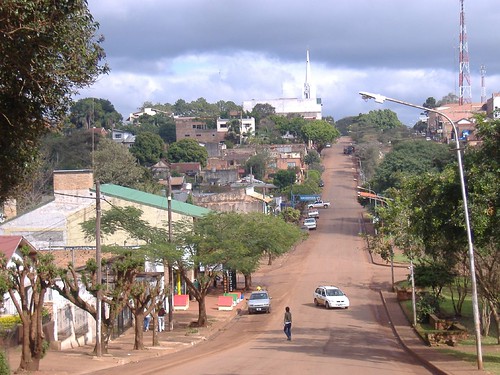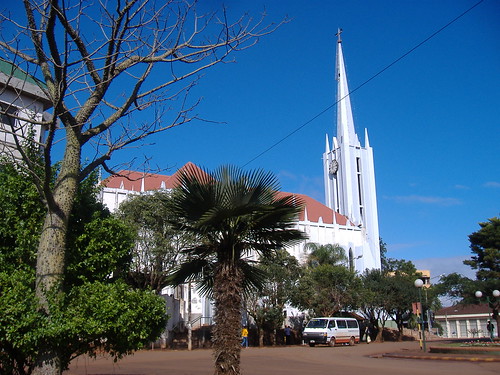Oberá is a city of 55,000 about 100 km east of Posadas — not a riverside town but a town of the forest, la Capital del Monte. It sits on a rich soil with up-and-down slopes, like frozen waves of red clay covered by trees, ferns, molds, grass, and fungi, all year round. (A friend of mine recommended me the place. He said Oberá looks as if it grew from the ground, rather than being planted on it.) You can walk along the center of Oberá and not miss anything (except skyscrapers) that you'd see on a large city, and still be surrounded by nature: the avenues are more like strings of small parks, and the trees also line the sidewalks.
The single most recognizable landmark in Oberá is the church of St. Anthony, which you can see from any part of the town (as long as you're not on the bottom of one of those slopes!).
Oberá was settled mainly by European immigrants, and the current residents haven't forgotten it. They have an Immigrants' Festival in September, in a park created especially for the purpose, with typical houses of each community; but during the rest of the year, the many street signs, squares, plaques and monuments honouring the city's immigrant heritage won't let you forget where these people came from.

I called from Posadas the day before and reserved a place in a "residence". The lady who talked to me on the phone wanted to know who and what I was, and (from the tone I guessed) why on Earth a young man from the big city was visiting Oberá.
 She warned me they only could provide a bed — not a private bathroom, only a toilet and an electric shower. And please, she told me, arrive before siesta time or there would be nobody to open the door for me! I was happy to comply. It was like a 1930s pension house, run by an old man who owned a bar next door, and her wife, both of them immigrants, I believe German — the lady could often be heard speaking to another old lady, maybe her sister, in what sounded as very fast German (could've been Polish as well — I didn't ask). She had a terrible accent when speaking Spanish, but made herself understood. And she was always up early in the morning, with a kettle keeping water at the exact temperature for a good mate — neither just warm nor almost boiling.
She warned me they only could provide a bed — not a private bathroom, only a toilet and an electric shower. And please, she told me, arrive before siesta time or there would be nobody to open the door for me! I was happy to comply. It was like a 1930s pension house, run by an old man who owned a bar next door, and her wife, both of them immigrants, I believe German — the lady could often be heard speaking to another old lady, maybe her sister, in what sounded as very fast German (could've been Polish as well — I didn't ask). She had a terrible accent when speaking Spanish, but made herself understood. And she was always up early in the morning, with a kettle keeping water at the exact temperature for a good mate — neither just warm nor almost boiling.The good news was the pension was right in the middle of Oberá. I didn't even have to pay for a taxi to take me there from the terminus, because it was only one block away. It was also only a block and a half away from the very center of the city, and (as I discovered soon) very close to a cybercafé where I could chat with the family and friends back there in Rosario and move my pictures from my camera's card to my pen drive, and also within walking distance of a bar that offered the most delicious takeaway empanadas I've ever tasted.
The main urbanization of Oberá is structured along an east–west avenue which changes names: the western end is called Avenida de los Inmigrantes, the downtown section is Avenida Sarmiento, and the eastern end is Avenida de las Américas. From the center of Sarmiento Ave. to the north runs Avenida José Ingenieros. Opposite that, there starts a diagonal to the southeast, Avenida Libertad. The triangular block formed by Sarmiento and Libertad is where the church of St. Anthony is. All these avenues run straight in the map, but when you walk them you become painfully aware of the z-axis. I exercised my legs a lot just by strolling around. Slopes of seemingly ten or fifteen degrees are not uncommon; there are places where heavy traffic is prohibited because the slope is dangerously high for some vehicles. You must either be in good shape or use the car all the time in Oberá.
In this city I finally felt OK , at home. The weather was still awful, except for one brief hour one morning and then during my last hours there, but I took my battered walking shoes and my umbrella and took to the streets eagerly. Oberá has two main attractions related to animals: one is the Birds' Garden (Jardín de los Pájaros), which is like a domesticated jungle with a narrow paved path that winds around large bird cages (and if it's raining when you go, the jungle-like impression is even stronger!). The other is the Reptilario, which as you may guess is home to snakes, iguanas, turtles, and even a yacaré (the smaller local version of the crocodile or alligator).


I tried to visit the Park of the Nations (Parque de las Naciones), where the Immigrants' Festival is held every year, but it was raining too much and it wasn't really worth it.
On my last full day I remembered I'd been told to visit something called Salto..., a waterfall in a natural camping site somewhere close to the city. I looked at the map and saw Salto Berrondo — 8 km from the city, reachable by bus. I packed my gear and went.

You have to be there. Really. A small stream runs into the site and is directed into a natural course and a cascade. You can get very close to it if you don't fear slipping on the wet rocks — in fact, you can stand right on the water if you want to. The place must be like paradise in the summer (and they'll charge you to let you in); in the winter, you can enter freely and wander about and you'll probably find only a couple of curious people, a group of teenagers camping in an isolated spot on the opposite end of the park, some locals sipping mate behind a small lake.
On Saturday, the last day of my stay, sunrise time was gray, but soon patches of blue started appearing. By noon the clouds had retreated almost completely. The afternoon was delicious. I cursed and thanked the random forces of nature for letting me see Oberá in its full radiant colours under the sun only for a few hours before my scheduled departure time. By 5:00 PM I had my bags prepared. I left them in the pension and went to buy my ticket to Posadas. I wandered aimlessly around, and just as I was craving some sugar, I ran into an icecream shop. I bought the smallest cup. It was twice what I had expected — about a quarter kilo of chocolate with dulce de leche and almonds. Perfect for a timidly warm winter dusk.
That was my goodbye gift from Oberá. At 6 PM I boarded my bus; by 7:30 I was in Posadas, waiting for the other bus, and at 8:15 I left for Rosario.
















“… wanted to know who and what I was, and (from the tone I guessed) why on Earth a young man from the big city was visiting Oberá”.
ReplyDeleteSo what did you tell her? We’ve been wondering the same thing too ;-)
I take it that it was warmer in Oberá, since you didn’t comment on how cold you were. In looking at the yearly temperature fluctuations, I’m surprised that it doesn’t get very hot in summer. But I presume the humidity becomes problematic, as do the insects. All those birds and reptiles must be eating something.
I guess the only downside is that the population appears to be quite religious, given the more than 30 active churches – hence the other name for Oberá - ”la Ciudad de las Iglesias”.
You'll have to brush up on your European languages it seems - German and Polish shouldn't be that hard to tell apart.
John
yo soy de Obera Misiones, Argentina
ReplyDeleteGaston.
Hi to everyone !
ReplyDeleteI want to met a girl from Misiones, I m travelling to Obera on 4/9/2009. If she is european immigrant, much bether, I m Russian and I live in Buenos Aires by now, my mail alexander_rrii@hotmail.com
Sincerly Alexander
Hola a todos !
Quisiera conocer una chica de Misiones, preferentemnte que sea inmigrante europea, del 4/9/2009 al 7/9 estare en la fiesta del Inmigrante en Obera, vivo en Bs As. Mi cel es 1561998177 , mail alexander_rrii@hotmail.com
Atte Alexander